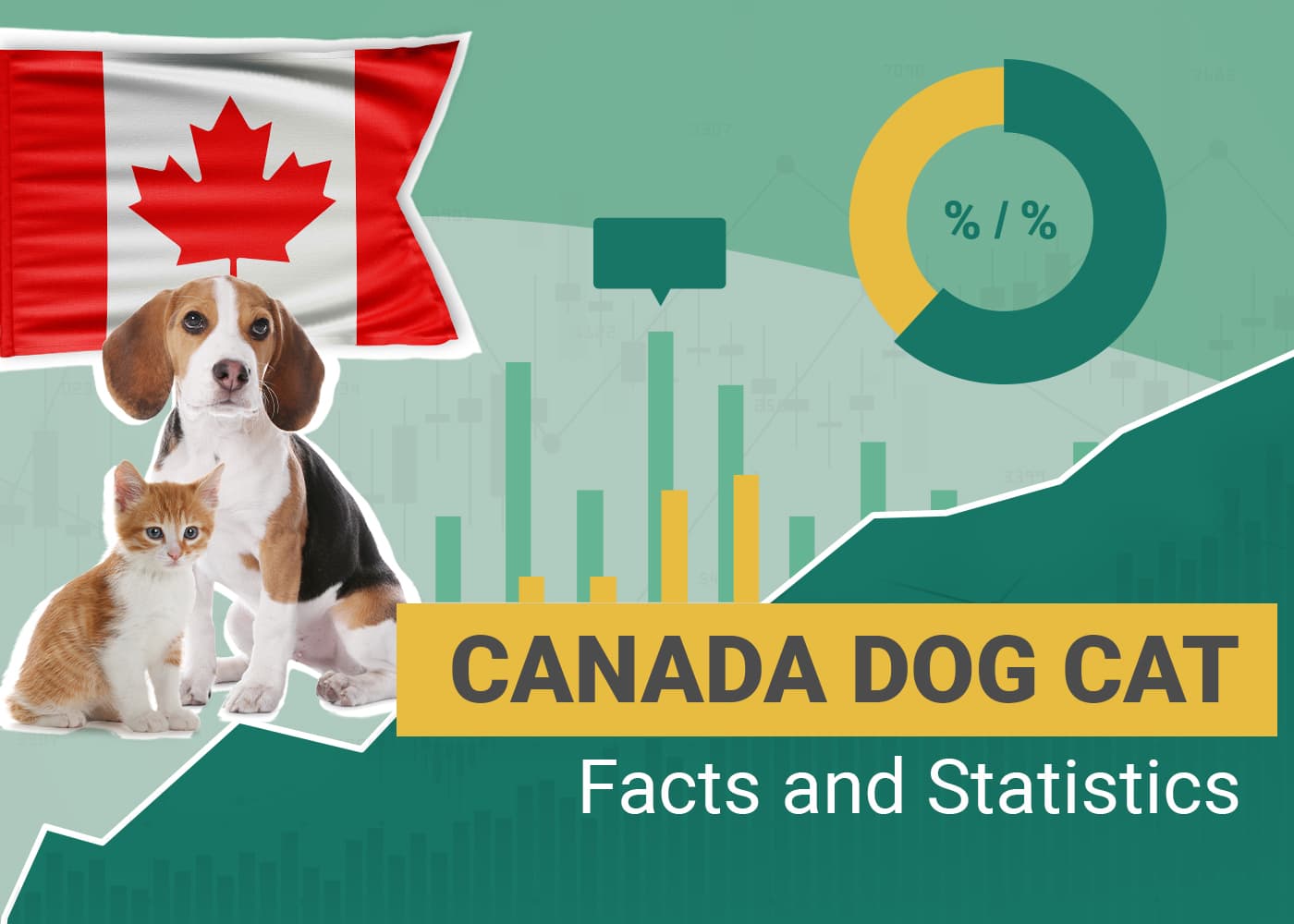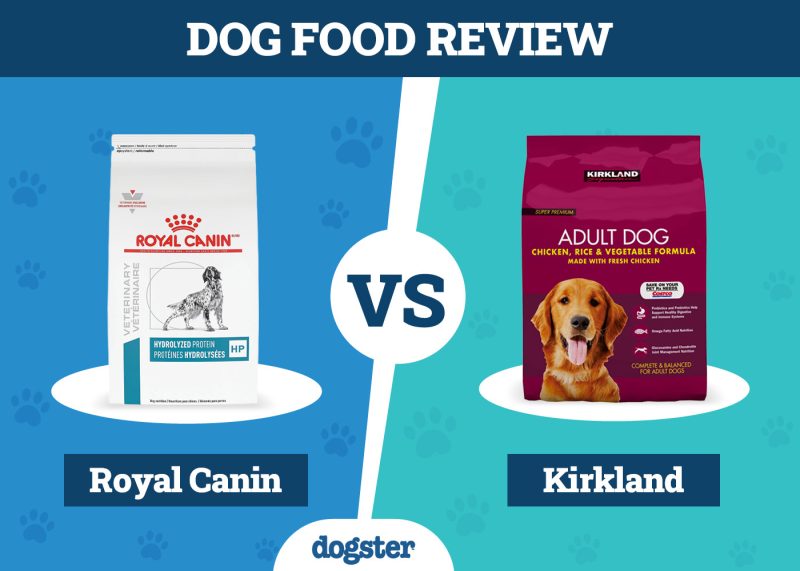In this article
Note: This article’s statistics come from third-party sources and do not represent the opinions of this website.
It’s no secret that Canadians love their pets. It’s not hard to see why when we consider that they provide us with unconditional love, promote our mental health, and make pretty fantastic snuggle buddies. However, what exactly do Canadians think about their cats and dogs?
Read on to find 21 fascinating new statistics about the state of cat and dog ownership across the country, including which pet Canadians prefer, how much we’re willing to spend on them, and the state of veterinary care in our country.

The 21 Canadian Dog & Cat Statistics
- The annual cost of owning a puppy in Canada is between $5,155 and $5,251.
- The yearly cost of owning a kitten in Canada is between $3,354 and $3,540.
- 60% of Canadian pet owners who take their pets for routine check-ups believe their vets charge too much.
- Over 50% of Canadian pet parents report the costs of pet-related goods and services have increased more than other frequently purchased items.
- 65% of Canadian pet owners report spending more on pet products now than pre-pandemic.
- There are an estimated 5.4 to 9.6 million free-roaming cats in Canada.
- Canadians own 8.5 million cats.
- Canadians own 7.9 million dogs.
- Three in five Canadians have a pet of some kind.
- 67% of Quebec pet owners have cats.
- Two-thirds of pet owners in the prairies and British Columbia have dogs.
- 71% of Canadian pet owners consider their pets to be members of their family.
- 35% of Canadians allow their pets to sleep in their beds.
- 95% of Canadian pet owners believe their pets have positively impacted their mental health.
- 141,800 cats were insured by their owners in 2023.
- 436,000 dogs were insured by their owners in 2023.
- The Canadian pet insurance market saw a 13.6% growth in insured pets between 2022 and 2023.
- There are approximately 15,459 veterinarians in Canada.
- 64% of veterinarians in Canada are female.
- There are 6,319 businesses in Canada in the veterinary services industry.
- There were 32.6% fewer job vacancies for veterinarians in the fourth quarter of 2023 compared to the same time the year prior.


Pet Cost Statistics
1. The annual cost of owning a puppy in Canada is between $5,155 and $5,251.
(Ontario Veterinary Medical Association)
The most significant costs associated with puppy ownership are the neutering and spaying procedures ($952 and $1,048, respectively) and food ($1,127).

2. The yearly cost of owning a kitten in Canada is between $3,354 and $3,540.
(Ontario Veterinary Medical Association)
The most significant costs associated with kitten ownership are the neutering and spaying procedures ($724 and $910, respectively) and food ($512).
3. 60% of Canadian pet owners who take their pets for routine check-ups believe their vets charge too much
(Angus Reid)
The cost-of-living crisis in Canada is impacting housing and groceries, as well as pet care. It’s not only routine check-ups that are becoming too expensive, either. Seventy-one percent of pet owners who made an emergency visit for their pets found the care to be too costly.
(Rover)
About 52% of Canadian pet owners believe their pet-related costs have increased more than groceries and personal care items. Sixty percent report being financially impacted by the increasing costs of pet food.

5. 65% of Canadian pet owners report spending more on pet products now than pre-pandemic.
(Freedonia Group)
Canadians place high value on their pets, which translates to an increased willingness to buy specialty products and services for them. The pandemic and the focus it brought on health and wellness may have impacted how Canadians choose to spend their money on their pets.

Canadian Pets by the Numbers Statistics
6. There are an estimated 5.4 to 9.6 million free-roaming cats in Canada.
(Canadian Veterinary Medical Association)
“Free-roaming” refers to cats that were previously socialized and owned but abandoned and unsocialized feral cats. Of the 5.4 to 9.6 million free-roaming cats in Canada, approximately 1.5 to 4.1 million are feral or unowned.
7. Canadians own 8.5 million cats.
(Canadian Animal Health Institute)
The Canadian cat population significantly increased between the start of the 2020 COVID-19 pandemic and 2022, going from 8.1 million to 8.5 million.

8. Canadians own 7.9 million dogs.
(Canadian Animal Health Institute)
The Canadian dog population grew from 7.7 million to 7.9 million from 2020 to 2022.
9. Three in five Canadians have a pet of some kind.
(Angus Reid)
Women and younger Canadians are more likely to have animal companions than men and those belonging to older generations. Only half of Canadians over the age of 55 report having a pet, compared to 65% of those between the ages of 18 and 34.
10. 67% of Quebec pet owners have cats.
(Pet Valu)
Cats are the most popular pet in Quebec, with 67% of pet owners reporting they have at least one cat and 48% reporting they have a dog. The reverse is true in the prairies, British Columbia, and the Northern provinces.

11. Two-thirds of pet owners in the prairies and British Columbia have dogs.
(Pet Valu)
Dogs are the pets of preference in the prairies, British Columbia, and Northern Canada, with 66% of pet owners in the prairies and 65% of British Columbia and Northern Canada pet owners having dogs. Compare this to just 51% of people in these provinces reporting that they have cats.

How Canadians View Their Pet Statistics
12. 71% of Canadian pet owners consider their pets to be members of their family.
(Angus Reid)
Just 6% of Canadian pet owners believe that they’re “not that close” with their pets. The feeling of a familial bond is more commonly reported among female pet owners than men. Additionally, 74% of Canadian pet owners between the ages of 18 and 34 report feeling “extremely close” to their pets, compared to just 66% of those between 35 and 54.
13. 35% of Canadians allow their pets to sleep in their beds.
(Pet Valu)
Pets in Atlantic Canada are more likely to sleep alongside their humans in their beds (42%) compared to owners in British Columbia and Northern Canada (36%) and Ontario (30%).

14. 95% of Canadian pet owners believe their pets have positively impacted their mental health.
(National Post)
Ninety-three percent of Canadians believe their animals help them live happier and healthier lives, while 91% report feeling less lonely in times of isolation thanks to their pets.

Canadian Pet Insurance Statistics
15. 141,800 cats were insured by their owners in 2023.
(North American Pet Health Insurance Association)
The number of total insured cats in Canada is slowly on the incline. In 2019, just 67,800 cats were insured, compared to the 141,800 owners who invested in cat insurance in 2023.
16. 436,000 dogs were insured by their owners in 2023.
(North American Pet Health Insurance Association)
The number of total insured dogs is rising, too, albeit at a much slower rate. In 2022, 391,100 dogs were insured, compared to the 436,000 that were insured in 2023.

17. The Canadian pet insurance market saw a 13.6% growth in insured pets between 2022 and 2023.
(North American Pet Health Insurance Association)
More and more Canadian pet owners are starting to see the benefits of investing in pet insurance. In 2022, 508,730 pets were insured, compared to 577,785 in 2023. In 2020, just 352,631 Canadian pet owners opted for insurance.

Canadian Pet Care Statistics
18. There are approximately 15,459 veterinarians in Canada.
(Canadian Veterinary Medical Association)
Ontario and Quebec have the most veterinarians, with 5,546 and 3,077, respectively. This makes sense as they’re the two most populated provinces. However, Alberta has the third most veterinarians (2,342), and it’s the fourth most populated province. British Columbia, Canada’s third-largest province, came in fourth with 2,042 veterinarians. By comparison, the Northwest Territories only has five veterinarians.
19. 64% of veterinarians in Canada are female.
(Canadian Veterinary Medical Association)
Of the 15,459 vets in Canada, 64% are female, 35.5% are male, and 0.5% have an undisclosed or unknown gender identity.

20. There are 6,319 businesses in Canada in the veterinary services industry.
(Statistics Canada)
As of December 2024, there were 6,419 businesses in the vet services industry in the country. This includes animal hospitals, surgical service clinics, testing laboratories, and livestock veterinary services.
21. There were 32.6% fewer job vacancies for veterinarians in the fourth quarter of 2023 compared to the same time the year prior.
(Statistics Canada)
Job vacancies for veterinarians have been slowly decreasing across the country over the last three years. In Q4 of 2021, there were 1,220 listings, compared to just 640 in Q4 of 2023.

Frequently Asked Questions
What are the most popular dog breeds in Canada?
According to the Canadian Kennel Club, the most popular dog breed in Canada in 2023 is the Labrador Retriever, which actually originated in Canada. The second is the Golden Retriever, and the third is the German Shepherd. In the fourth and fifth spots are the French Bulldog and the Poodle.
(Canadian Kennel Club)

What are the most popular cat breeds in Canada?
According to a Rover survey, the most popular cat breed in Canada is the Domestic Shorthair, followed closely by the American Shorthair and the Domestic Longhair. Finally, in the fourth and fifth spots are the Ragdoll and the Siamese. While most dog owners know what their pup’s breed is, or at least have some idea of what breeds make up their DNA, the same Rover study shows that 38% of cat owners don’t know their cat’s breed.
(Rover)
Are there any cat or dog breeds native to Canada?
Several cat breeds were born and bred in Canada, including the Chantilly-Tiffany, Cymric, Foldex, Sphynx, and Tonkinese.
Five modern dog breeds originated in Canada, including the Canadian Eskimo Dog, Landseer Dog, Mackenzie River Husky, Newfoundland Dog, and the Nova Scotia Duck Tolling Retriever. However, four extinct breeds also originate in Canada: the Hare Indian Dog, Salish Wool Dosh, St. John’s Water Dog, and the Tahltan Bear Dog.
What other pets do Canadians keep?
While the majority of Canadians (61%) have a pet, dogs and cats are by far and large the most common household pets. However, 7% of Canadian households have fish, 3% have birds, 3% have small mammals, 2% have reptiles or amphibians, and just 1% have exotic animals like sugar gliders or tarantulas.
(Open Government Program Alberta)


Conclusion
Cats and dogs are, by far, the most popular household pets in the world, and the same rings true for Canada. There’s no denying how much Canadians love and care for their pets. Even in an economy that’s certainly seen better days, Canadians are ready and willing to spend the money necessary to keep their pets healthy, happy, and thriving.
Featured Image Credit: Chendongshan, Shutterstock






















